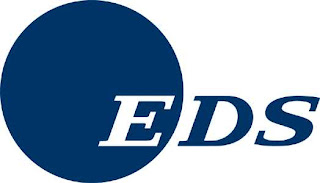HP may be buying EDS, aka, "HP Global Services"
 Big Blue’s biggest weapon has long been its services arm. As the saying goes, when you buy enterprise “solutions” from IBM, the bulk of the sale is the van full of services folks with packed suitcases, ready to move into your office for good. Just hand over your checkbook. Good luck getting rid of the services squad.
Big Blue’s biggest weapon has long been its services arm. As the saying goes, when you buy enterprise “solutions” from IBM, the bulk of the sale is the van full of services folks with packed suitcases, ready to move into your office for good. Just hand over your checkbook. Good luck getting rid of the services squad.
IBM Global Services differentiates IBM from, say, Microsoft, which sells its software through the channel, leaving the lucrative services business for partners. In a few cases, as with its Avenade joint venture with Accenture, Microsoft does capture some of the revenue, but otherwise, Microsoft doesn’t play in that world.
Hewlett-Packard is another Big Blue competitor that just doesn’t measure up when it comes to services and service revenue. Eight years ago, HP almost bought Pricewaterhouse Coopers, but the deal fell though. (IBM snapped up PwC a couple of years later.)
Now, apparently, HP is ready to try again by buying EDS, as reported by Reuters and other sources. To quote from Reuters:
Hewlett-Packard Co is in talks to buy technology outsourcing company Electronic Data Systems Corp for $12 billion to $13 billion, seeking to better compete with the top computer services company, IBM.
The acquisition would be HP’s biggest since its $19 billion acquisition of Compaq in 2002. News of the talks, first reported by the Wall Street Journal, sent shares of EDS soaring nearly 28 percent, taking its market value to about $12 billion.
HP shares fell nearly 5 percent amid some skepticism that slow-growing EDS would provide more than a one-time boost, and might not be worth a premium of as much as 37 percent.
HP admits, by the way, that it’s in talks with EDS:
HP today confirmed that it is engaged in advanced discussions with Electronic Data Systems Corporation regarding a possible business combination involving the two companies. There can be no assurances that an agreement will be reached or that a transaction will be consummated. HP does not intend to comment further until an agreement is reached or discussions are terminated.
To me, this doesn’t seem like a good deal. But then again, I’m skeptical about HP’s ability to full advantage of large acquisitions. HP never achieved the value it could have from the Compaq fiasco, and the jury is still out as to whether HP and Mercury Interactive are better off a single company. Certainly, Mercury’s competitors remain delighted about the acquisition — and the amount of business they picked up because of it.
